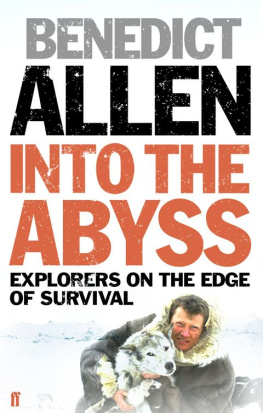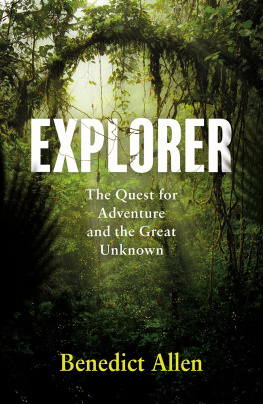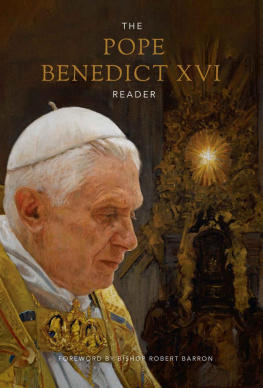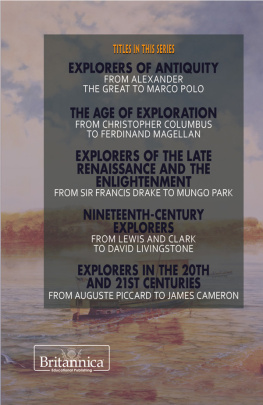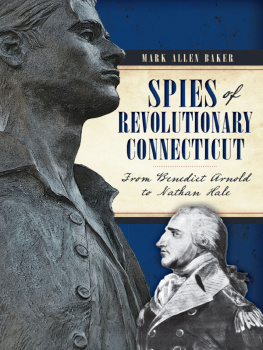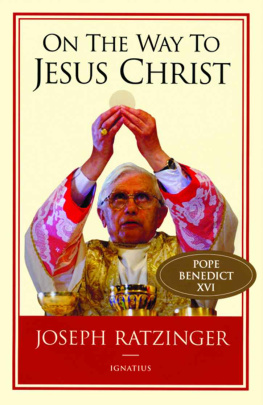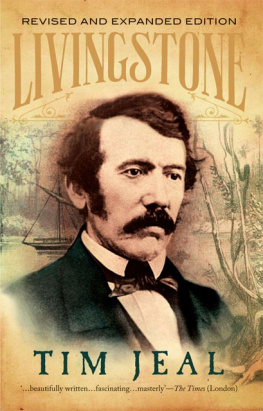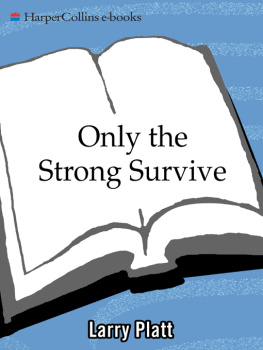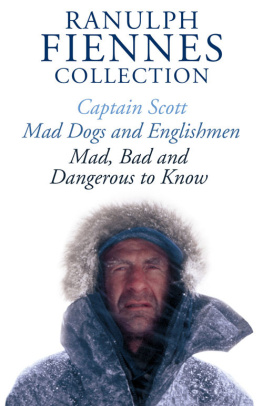Benedict Allen - Into the Abyss
Here you can read online Benedict Allen - Into the Abyss full text of the book (entire story) in english for free. Download pdf and epub, get meaning, cover and reviews about this ebook. year: 2011, publisher: Faber & Faber, genre: Detective and thriller. Description of the work, (preface) as well as reviews are available. Best literature library LitArk.com created for fans of good reading and offers a wide selection of genres:
Romance novel
Science fiction
Adventure
Detective
Science
History
Home and family
Prose
Art
Politics
Computer
Non-fiction
Religion
Business
Children
Humor
Choose a favorite category and find really read worthwhile books. Enjoy immersion in the world of imagination, feel the emotions of the characters or learn something new for yourself, make an fascinating discovery.
- Book:Into the Abyss
- Author:
- Publisher:Faber & Faber
- Genre:
- Year:2011
- Rating:5 / 5
- Favourites:Add to favourites
- Your mark:
- 100
- 1
- 2
- 3
- 4
- 5
Into the Abyss: summary, description and annotation
We offer to read an annotation, description, summary or preface (depends on what the author of the book "Into the Abyss" wrote himself). If you haven't found the necessary information about the book — write in the comments, we will try to find it.
Why do explorers put themselves in dangerous situations? And, once the worst possible situation occurs, how do they find the resources to survive?
In answering these questions, Benedict Allen weaves a series of tales from his own experience as well as that of other explorers including Columbus, Cortez, Scott, Shakelton, Stanley, Livingstone and their modern counterparts: Joe Simpson and Ranulf Fiennes.
Into the Abyss — read online for free the complete book (whole text) full work
Below is the text of the book, divided by pages. System saving the place of the last page read, allows you to conveniently read the book "Into the Abyss" online for free, without having to search again every time where you left off. Put a bookmark, and you can go to the page where you finished reading at any time.
Font size:
Interval:
Bookmark:
To the memory of Charlie Forman, a dear friend
So, youre now asking if it was clinging on to an idea that kept me alive in the Pacific? Look, I dont know the answer to all your questions about survival, Mr Allen. You must keep on asking around: I know only that pursuing ideas has almost killed me.
Thor Heyerdahl, not long before his death, at a lunch to celebrate theKon-Tiki expedition and a life of adventure
At times it seemed to me that it was my destiny: that I was simply meant to live, Benedict. Other times I thought there might be something inside that we may call upon to sustain us something ancient, perhaps carried with us from our first home in Africa.
Laurens van der Post, asked what enabled him to survive while aJapanese POW and on journeys into the Kalahari and elsewhere
THE RUSSIAN FAR EAST
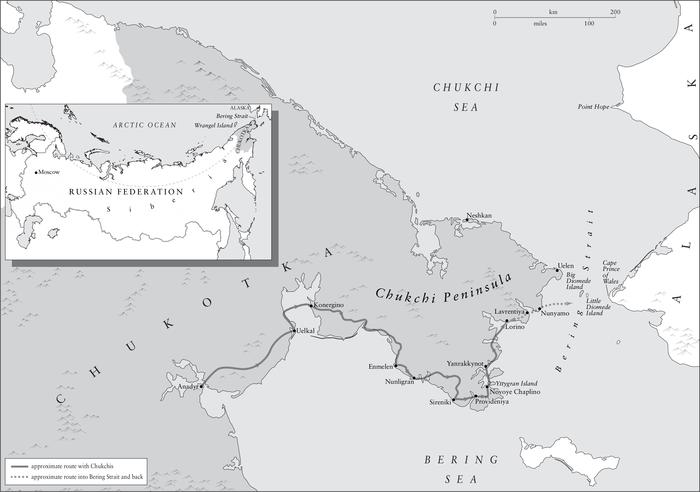
Chapter I
When I think of Siberia I smile. Thats not to say Siberia turned out to be a happy land of skipping children and promenading lovers, but if youre picturing that ridiculous old stereotype a nasty, frozen-stiff, windblown hell, snow snagging occasionally on ruins but otherwise tumbling for miles well, thats about right.
However, Siberia is a land of survivors as well as the Gulags, and survivors speak to us of possibility. A place of despair becomes the terrain of what might be. Even the smallest act becomes a feat, a fight-back. So when I think of Siberia I dont think of the unfortunate weather or my expedition as it fell to bits but the inspiration I found out there, a certain kind of rare beauty and strength. And I think of a night when I might have died a night that stands out, even on this particular trip.
A cold silence had passed over my dog team. I couldnt see much in the starlight, but I knew the sounds of the ten dogs the weight of their breathing, the click of their paws on the ice and I sensed that something was very wrong. I threw the sledge anchor into the ground, but it was already too late. I saw my two lead dogs disappear; the two animals I trusted with my life had dropped from sight. And now I knew why the team had gone quiet. It was the moment that we all recognize instinctively, that moment when we know weve bitten off more than we can chew, when we have risked all and been caught out. The dogs had made a mistake, and they knew as much as dogs can know about these things that they might die. They were heading over a precipice.
Exactly how far the fall was, Id soon find out already the second row of dogs had followed the first off the cliff. The third would go too, then the fourth, their feet scrabbling in the air as they tumbled into the void.
Soon enough it would be my turn.
What happened next took only a few seconds, but time seemed to slow, giving me all the space in the world in which to contemplate our unhappy fate. As the sledge launched off the ledge and I flew through the darkness to what might be my end, I even managed a wry smile at the irony of it.
I was being taken to my death by hardened professionals. At minus forty, these dogs only shelter was the snow; their food was frozen walrus; their water was the ice which they gnawed as they ran. Yet were they so different from us, these creatures? We are, after all, pack animals.
Each of my dogs was doing his utmost to make a go of things, as we humans do within our own tribes. Youll have seen them before: in your workplace, the alpha male who struts in the boardroom, the plodder happy in the corner of the office; or at home, the boy striving to get a half-decent mark at maths, his mum trying to be a better friend.
The ground rules were always the same: whether we lived our lives ponderously or in haste, whether as stalkers or grazers, in silence or in song, life was warfare. It was a sequence of skirmishes, advances and retreats, as we each sought to improve our chances of survival.
And if you really want to know how we humans go about the business of surviving, where better than Siberia? And what greater expression of mans ingenuity than the relationship weve forged with the dog? Mans best friend, we are fond of saying. Well, in the Russian Far East he is sometimes mans only friend. There the two species can be seen working with geometrical perfection: man contributing his brain and tool-making hands, dogs their senses and physical stamina.
That is how it was that winter: my dog team, like a diamond-tipped lance, piercing the northernmost tundra. Nothing was quite able to stop us. We came to decayed settlements and communities steeped in alcohol, and the dogs passed through them, unscathed. They remained undiminished, without, it seemed, even a scratch. These animals succeeded in the harshest land humans had ever successfully colonized, while in less demanding parts of the very same planet we humans in our own packs have such mixed fortunes so many disappointments and broken dreams.
Ten colleagues, then, each doing their bit tonight to deliver me through terrain that offered so little. Except that the dog leading this particular foray had made one elementary mistake and we were about to face the consequences.
It was upon us, the event that might mean our end. I wasnt much aware of the pain at first, just that Id taken the first impact and that there would be more. I was close behind the rear dogs, and the 300-kg sledge had smashed me into the snow with what felt like the force of a train. But the sledge was still upright, and I sensed we were speeding up, not slowing. Skating down a crumpled bed of ice, perhaps. Snow was striking my face, flying past as we careened left, then right, creating what seemed like a funnel of light through the dark. But there was always the one comforting thought: if I was to die, it would be alongside my dogs.
That night there was something so exquisitely beautiful in their unity of purpose, something beautiful even in them flying, as one, into the abyss.
Chapter II
Even as a child Id wondered at those with a capacity to survive. They stepped from burning planes, they hauled themselves from swamps, they walked in from the cold. I knew quite a lot about the latter because of Grandads book about British polar explorers. A slim volume, it lay unnoticed at first among his Victorian editions of Punch. I remember first setting eyes on it as my grandfather, a man with a fondness for Foxs Glacier Mints and who had only one arm, was doing his best to ease it from where it lay trapped between the solid, leather-bound ranks. The cover was the toothpaste blue of a crevasse and smelt of Grandads pipe tobacco; the spine was splintered and the pages inside had the palid, exhausted quality of old skin, as if the book itself had been recovered like a corpse from a blizzard. As it turned out, the book had been published during the Second World War to remind readers of the virtues of duty and sacrifice, although even aged six I noticed that rather a lot of these polar explorers had got nowhere near the Pole. Many had botched their plans and some didnt seem to have planned very much at all.
My favourite story was of Sir John Franklin, a Victorian of great distinction who got into trouble or so it seemed whenever he led his men beyond the Arctic Circle. Once, he was reduced to eating tripede roche, which, I learnt, was a type of lichen. I pictured it as an omelette, only grey and with the texture of sea sponge. Franklins men suffered, and then suffered some more, as they silently ate their tripede roche and tried to escape the iron grip of the cold. On they staggered into a wall of icy wind. They ate their moccasins. They even ate bones chucked away by people who had been desperate themselves. And the great thing was, they didnt die! At least, not at first. Then one of their number, a native guide called Michel, decided he couldnt stand it any more. He got out his gun. But it wasnt suicide he was thinking of, it was his next meal. And while trying to solve the problem of where that might come from, his eyes alighted on a companion. I pictured the scene: a man with a face black with frost who was sick of eating spongy omelette and now had a really terrific idea that suddenly made him altogether perkier. He licked his lips and then he began stalking his friend as you might a passing deer. He aimed, fired, dragged the corpse to a convenient spot and then made a lovely roaring fire. When he had roasted him until he was just right, he ate him up.
Font size:
Interval:
Bookmark:
Similar books «Into the Abyss»
Look at similar books to Into the Abyss. We have selected literature similar in name and meaning in the hope of providing readers with more options to find new, interesting, not yet read works.
Discussion, reviews of the book Into the Abyss and just readers' own opinions. Leave your comments, write what you think about the work, its meaning or the main characters. Specify what exactly you liked and what you didn't like, and why you think so.

